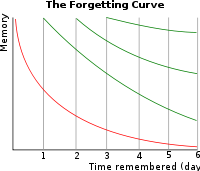- Forgetting curve
-
The forgetting curve hypothesizes the decline of memory retention in time. A related concept is the strength of memory that refers to the durability that memory traces in the brain. The stronger the memory, the longer period of time that a person is able to recall it. A typical graph of the forgetting curve purports to show that humans tend to halve their memory of newly learned knowledge in a matter of days or weeks unless they consciously review the learned material. This conclusion is not currently supported by evidence since the only studies done by Ebbinghaus are on himself. This does not meet the standards for scientific research.[1]
Contents
History
In 1885, Hermann Ebbinghaus extrapolated the hypothesis of the exponential nature of forgetting. The following formula can roughly describe it:
 where R is memory retention, S is the relative strength of memory, and t is time.
where R is memory retention, S is the relative strength of memory, and t is time.Hermann Ebbinghaus ran a limited, incomplete study on himself and published his hypothesis in 1885 as Über das Gedächtnis (later translated into English as Memory: A Contribution to Experimental Psychology). Ebbinghaus studied the memorisation of nonsense syllables, such as "WID" and "ZOF". By repeatedly testing himself after various time periods and recording the results.
Description
Ebbinghaus hypothesized that the speed of forgetting depends on a number of factors such as the difficulty of the learned material (e.g. how meaningful it is), its representation and physiological factors such as stress and sleep. He further hypothesized that the basal forgetting rate differs little between individuals. He concluded that the difference in performance (e.g. at school) can be explained by mnemonic representation skills.
He went on to hypothesize that basic training in mnemonic techniques can help overcome those differences in part. He asserted that the best methods for increasing the strength of memory are:
- better memory representation (e.g. with mnemonic techniques)
- repetition based on active recall (esp. spaced repetition)
His premise was that each repetition in learning increases the optimum interval before the next repetition is needed (for near-perfect retention, initially repetitions may need to be made within days, but later they can be made after years).
There is debate among believers in the hypothesis about the shape of the curve for events and facts that are more significant to the subject.[citation needed] Some believers, for example, suggest that memories for shocking events such as the Kennedy Assassination or 9/11 are vividly imprinted in memory. Other believers have compared contemporaneous written recollections with recollections recorded years later, and found considerable variations as the subject's memory incorporates after-acquired information.[citation needed] There is considerable research in this area as it relates to eyewitness identification testimony.[citation needed] It should be noted that eye witness accounts are demonstrably unreliable. [2]
It is purported that in a typical schoolbook application (e.g. learning word pairs), most students remember only 10% after 3–6 days (depending on the material).[citation needed] Therefore, 90% of what was learned is forgotten.[citation needed]
Research on the relationship between original learning and forgetting shows that higher degree of original learning means lowering forgetting.
Notes
- ^ {cite web |url=http://rer.sagepub.com/content/52/2/291.abstract |title=Scientific Guidelines for Conducting Integrative Research Reviews}
- ^ {cite web|http://www.scientificamerican.com/article.cfm?id=do-the-eyes-have-it title|Why Science Tells Us Not to Rely on Eyewitness Accounts}
References
- "Memory: A Contribution to Experimental Psychology -- Ebbinghaus (1885/1913)". http://psychclassics.yorku.ca/Ebbinghaus/index.htm. Retrieved 2007-08-23.
- Schacter, Daniel L (2001). The seven sins of memory: how the mind forgets and remembers. Boston: Houghton Mifflin. ISBN 0-618-21919-6.
- Baddeley, Alan D. (1999). Essentials of human memory. Hove: Psychology. ISBN 0-86377-544-6.
- Bremer, Rod. The Manual - A guide to the Ultimate Study Method (USM) (Amazon Digital Services).
- Loftus, Geoffrey R. Journal of Experimental Psychology: Learning, Memory, and Cognition11. 2 (Apr 1985): 397-406.
Spaced repetition Concepts Spaced repetition • Spacing effect • Testing effect • Forgetting curve • Flashcard • Memory • Leitner system
Study Software Practitioners Researchers Categories:- Memory processes
Wikimedia Foundation. 2010.

